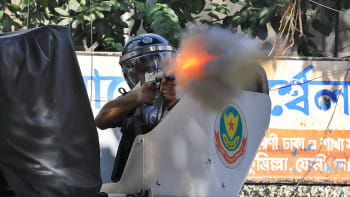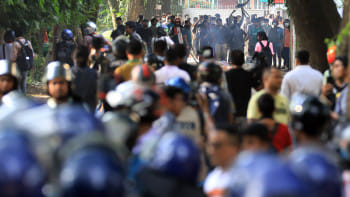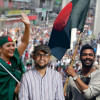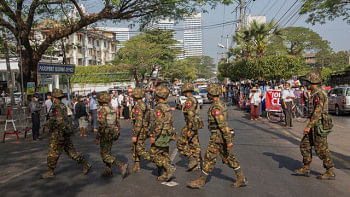Killings during quota reform movement: Crossing the red line

A recent example of what can happen if there is no minimum democratic and governance accountability in a country is the unprecedented brutality shown by the government and the killing of more than 200 people (according to Prothom Alo) during the quota reform movement this month. The agitation, which began following a High Court verdict on June 5 reinstating the quota system in government jobs, was limited to peaceful rallies. But the government did not give due importance to the students' demands and did not even try to negotiate with them, saying that it was a court matter.
The movement turned violent on July 15 when the ruling party's student wing, Bangladesh Chhatra League (BCL), attacked protesting students at several public universities, including Dhaka University. Even after the tragic killing of six youths on July 16 in attacks by police and BCL, the government did not budge. If it had removed the police and BCL men from the streets and had taken the initiative to negotiate with the protesters on their quota reform demand, the subsequent brutal killings could have been avoided.
Analysing 150 of the deaths, Prothom Alo found that students and workers were the majority of the victims of the fatal violence and clashes centring around the quota reform movement. As many as 113 victims (75 percent) were children, teenagers and young adults. Nineteen were children and adolescents including a four-year-old child. Ninety-four were 18-29 years old, 21 were 30-39 years old, and 16 were about 40 years old. At least 45 victims were students of different public and private universities, schools and colleges. Besides, a large number of the dead were labourers, petty traders, shopkeepers, drivers, and low-income earners. The analysis also revealed a horrifying reality: most of the dead bodies bore live bullet injuries, while marks of pellets, rubber bullets or other types of injuries were little.
Usually during a mass movement when thousands of people take to the streets, there is a belief among them that law enforcement agencies will not fire directly on them no matter what. If there is a large number of people in a protest march, there is no fear. One reason for this is the collective power of a large crowd. Another reason is the idea that no state force would open fire on large numbers of people. It is a red line that LEAs around the world would never cross—except those in countries that are ruled by military dictatorship or occupation armies. The LEAs and militaries of any modern state have a wide variety of weapons at their disposal—machine guns, tanks, fighter jets, helicopter gunships, etc—which can kill a large number of people in an instant. But law enforcement forces of any decent civilised and democratic country would never use these weapons on an indiscriminate, wholesale basis against their own people. They simply can't, because crossing this red line means breaking the people's contract with the state. The people give the exclusive power to use force to the state on the condition that this force would be used to protect the people, not to kill them.
That's why in the situation of mass unrest, LEAs use non-lethal weapons and tear gas, charge batons, use water cannons, etc and try their best to disperse people without causing fatal harm. In some extreme cases, if law enforcers are forced to shoot, they usually shoot at legs, and they don't fire indiscriminately in such a way that it might kill not only the demonstrators, but also the pedestrians, shopkeepers, rickshaw pullers, hawkers and even children standing on rooftops or balconies. No law enforcers of any democratic country would directly shoot at the chest, head or eyes of the common people, because they will be held accountable for every shot. Once this red line is crossed, a country's government loses its legitimacy and people's trust.
In Bangladesh, the ruling Awami League-led government has employed the country's law enforcement agencies against the people before. They have been accused of extrajudicial killings, enforced disappearances, and violent suppression of the political opposition's activities. These are also red lines that no democratic government should cross. But this time, the line crossed by the government while suppressing the quota reform movement with authoritarian aggression is completely different. It is one thing to unleash sudden violence on the rallies of opposition parties or commit targeted enforced disappearance or extrajudicial killings, but it is completely another to permit indiscriminate shooting on thousands of agitating protesters, including school, college and university students, who have taken to the streets across the country for several days.
Even after so many killings, there is no credible action on the government's part to admit the wrongdoings or bring the killers to justice. Not only that, cases have been filed against hundreds of thousands of people without proper investigation, and activists and opposition party members are being arrested at a wholesale rate in block raids. This is indicative of more oppressive government action in the coming days.
If the government cannot be pressured strongly and effectively from all quarters for impartial investigations, trials and accountability of these killings, and if the perpetrators get away with killing so many innocent people, including children, the danger will increase even more for the people of the country.
Kallol Mustafa is an engineer and writer who focuses on power, energy, environment and development economics. He can be reached at [email protected].
Views expressed in this article are the author's own.
Follow The Daily Star Opinion on Facebook for the latest opinions, commentaries and analyses by experts and professionals. To contribute your article or letter to The Daily Star Opinion, see our guidelines for submission.

 For all latest news, follow The Daily Star's Google News channel.
For all latest news, follow The Daily Star's Google News channel. 











Comments